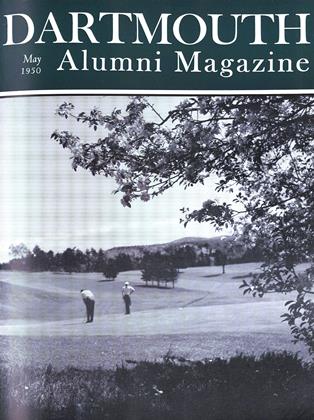THE opportunity to study abroad, on prize scholarship grants of $2,000 each, is open to Dartmouth graduates for the coming year, it was announced by President Dickey late in March. These new scholarships, four of which are available for 1950-51, will be the first of the James B. Reynolds Foreign Scholarships, named for the late Mr. Reynolds of Washington, D. C., member of the Class of 1890, who left a trust fund to finance a number of such awards for young Dartmouth graduates each year.
Application for the Reynolds Foreign Scholarships for 1950-51 must be filed by May 15 with the Committee on Fellowships and Prizes, headed this year by Prof. John Hurd '21 of the English department. Preference normally will be given to applicants who have graduated from Dartmouth within five years of the date of award, although in cases of exceptional merit awards will be made to graduates out of college more than five years. Seniors receiving their degrees in June are also eligible. Some flexibility exists also in the amount of the awards, which the Committee is empowered to increase beyond $2,000 when special need can be demonstrated or other extraordinary reasons exist. Marital status will not be a factor in selecting the Reynolds Scholars.
STUDY PROGRAM REQUIRED
Each applicant must present a definite program of study, whether formal graduate work or otherwise. "The soundness of this program and its possible benefit to society as well as to the individual shall be key factors in the awards of the scholarships," according to the special committee appointed by President Dickey to work out the establishment of the scholarships.
No restrictions will be made upon the place of study, but the scholarship holder normally will be expected to affiliate himself with an established educational institution abroad. In exceptional cases, however, men may receive grants to do independent research in libraries abroad or to undertake other approved programs of self-education, such as in the fields of art and music. Normally awards will be for one year only.
In general, Dartmouth's Committee on Fellowships and Prizes will follow the Rhodes Scholarship pattern in selecting men for the Reynolds Foreign Scholarships, which are designed to be prizes of the greatest distinction among young Dartmouth graduates. It has been proposed that, similar to Rhodes Scholarship procedure, the Committee be assisted by outside advisers at a series of final inter- views before making selections.
James B. Reynolds, whose bequest has made the foreign scholarships possible for Dartmouth men, was a leading customs lawyer in Washington for many years prior to his death in 1948. He was Assistant Secretary of the Treasury from 1905 to 1909, a member of the U. S. Tariff Board from 1909 to 1912, Secretary of the Republican National Committee from 1912 to 1920, and was a close friend and adviser to Calvin Coolldge, whose pre-convention and campaign manager he was in in 1920 when Coolldge was elected Vice President. Along with his legal and political activities, he was a leading figure in Dartmouth alumni affairs for many years. The Reynolds Foreign Scholarships are financed by two-thirds of the income of a trust fund administered in Washington. Upon the termination of the trust, twothirds of the principal of the fund comes to Dartmouth for perpetuation of the Reynolds Scholarship program.
The committee named by President Dickey to devise the form of the scholarships and the conditions of their award was headed by John F. Meek '33, College Treasurer, and also included Dean Morrison, Dean Neidlinger, and Profs. Roy P. Forster, John Hurd, John W. Masland and John H. Wolfenden.
 View Full Issue
View Full Issue
More From This Issue
-
 Article
ArticleWDBS
May 1950 By DICK T. HOLLANDS '50 -
 Class Notes
Class Notes1917
May 1950 By KARL W. KOENICER, DONALD BROOKS, HOWARD A. STOCKWELL -
 Class Notes
Class Notes1918
May 1950 By ERNEST H. EARLEY, DONALD L. BARR, RICHARD A. HOLTON -
 Class Notes
Class Notes1923
May 1950 By TRUMAN T. METZEL, COLIN C. STEWART 3RD, LEON H. YOUNG JR. -
 Class Notes
Class Notes1905
May 1950 By ROYAL PARKINSON, GILBERT H. FALL, FLETCHER A. HATCH -
 Class Notes
Class Notes1929
May 1950 By F. WILLIAM ANDRES, EDWIN C. CHINLUND, GEORGE B. REDDING
Article
-
 Article
ArticleOUTING CLUB AWARDS MEDAL TO ALBERT E. PILLSBURY
March 1921 -
 Article
ArticleCOLLEGE RECEIVES PORTRAIT OF ANCESTOR OF NAMESAKE
JANUARY, 1927 -
 Article
ArticleAssociate Medical Dean
DECEMBER 1967 -
 Article
ArticleGil Swett '17 Given Bequest Chairman Honors
JUNE 1969 -
 Article
ArticleRoger Brown '57, adventure photographer: a guest on the mountain
September 1986 By ROSALIE ISOM -
 Article
ArticleWARNING TO A FOETUS
April 1945 By Ted Boorum '40

